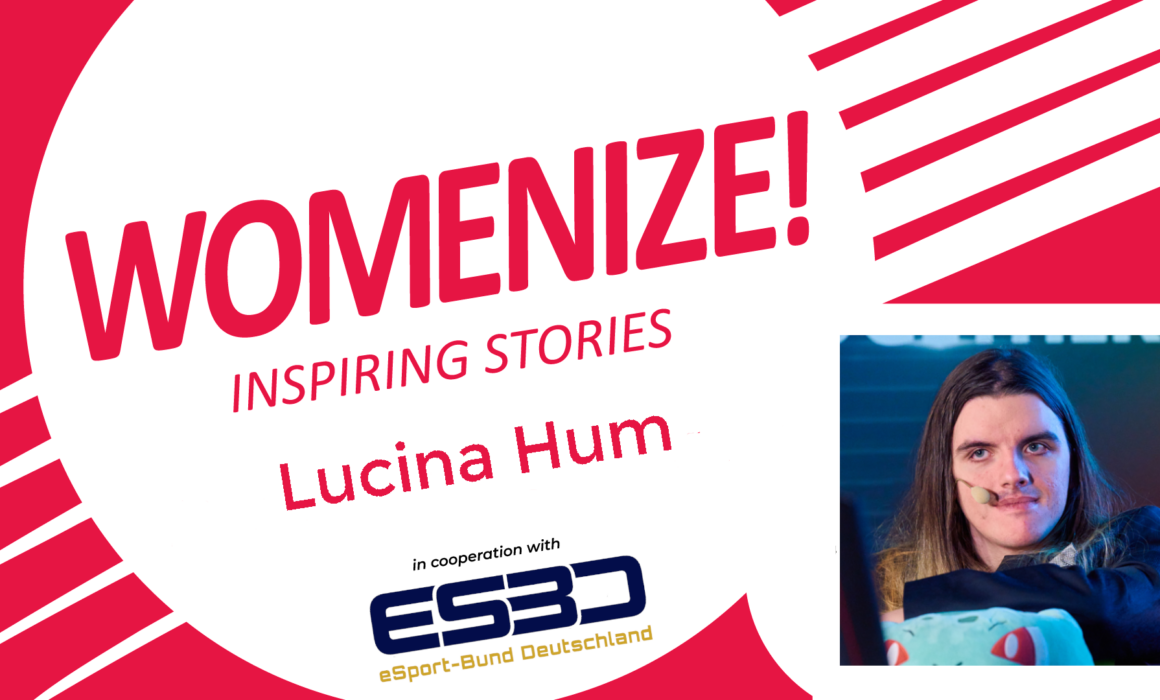Lucina Hum – Womenize! – Inspiring Stories
Womenize! – Inspiring Stories is our weekly series featuring inspirational individuals from games and tech. For this edition, we collaborated with ESBD – eSport-Bund Deutschland e.V. and talked to Lucina Hum, Founder & Creator of Bisalina Speedruns. She speaks about how her love for Speedrunning inspired her to build Europe’s largest Speedrunning charity event, overcoming industry challenges in Germany, promoting accessibility, and using her platform to support mental health and inclusivity in gaming. Read more about Lucina here:
Hi Lucina! You founded BisaIina Speedruns in 2017 and brought Speedrunning to the big stage in Europe. What sparked your passion for Speedrunning, and what gave you the courage to turn that passion into something so impactful and visible?
I started Speedrunning by seeing someone play Metroid Prime 2, which is my favorite game. I thought that I played this game for over 1000 hours and knew everything, but, oh gosh, was i wrong. The way people rushed through that game with their defined movement and sometimes went outside the walls of the game to skip huge parts, made me completely flabbergasted, maybe even be fumbled, and I just had to do it myself. So through a lot of hard work and grinding, I got the world record in that game and then in the 1st and 3rd Game, as well as tons of other ones. After a couple of years of Speedrunning, I heard a streamer in 2017 with 1000 Viewers saying that he can’t do charity fundraising because his reach is too small, and I was so motivated to prove him wrong that I started streaming immediately and just speedran my games for hours, days, and at some point even weeks on end. Year after year, the events became bigger, more defined, and I was just sitting there playing games for 3 weeks for charity and thought that this was the coolest thing ever.
After I graduated and held my first Twitchcon panel, I was asked to host a gigantic Speedrunning event, which was cooperating with my own event that I did the years prior, but now condensed into a 20-person influencer show for 1 evening on-site. It was great, and I streamed the 3 weeks after it for Charity anyway. I thought that i would love to make the event even bigger, and so I organized multiple gigantic events year after year, culminating in the biggest Speedrunning event of all time in that short 6 hour timeframe put together with 60 influencers on the gamescom social stage. I am hooked on Speedrunning and charity, and I will continue with everything i can the rest of time. Getting Speedrunning into the German Esport Definition was just the beginning and i am glad for everything that is coming in my future
Creating the biggest Speedrun charity event in Europe is no small feat, especially in a country where Speedrunning wasn’t always widely understood. What were some of the biggest challenges you faced breaking that ground in Germany, and how did you keep going through them?
Getting Speedrunning to where it is now was really no easy task. After talking with hundreds of influencers, partners, sponsors, etc., I was probably the driving force behind most firms actually having to learn what Speedrunning is. I am so committed to getting Speedrunning to new places that it has never been before that I even taught Christian Solmecke how to play The Legend of Zelda with one hand. The biggest Challenge definitely is to find new people, immediately getting the best ideas and building up contacts and reach. You can always go a step-up if you really want to, and sometimes you need to throw your head against the wall to get new ideas.
Speedrunning in Germany before I changed some things up was basically just doing what North America did, and it really did not work at all, so I set sights on the influencers who actually have reach and tell people that Speedrunning is super-duper difficult. If I teach them how to do Speedrunning tricks in Super Mario World and they as well as the press talk about how nice and easy it was, then maybe I can break that stigma of it and showcase that it is really not that hard to get into.
Through panels and events, you’ve helped shape the dialogue around ESports in Europe. What kind of future do you envision for the Speedrunning and ESports scene, especially when it comes to creating more space for women and underrepresented communities?

